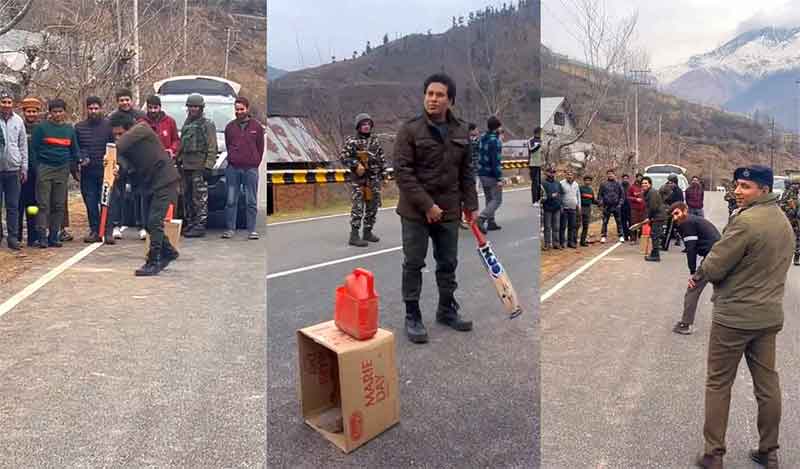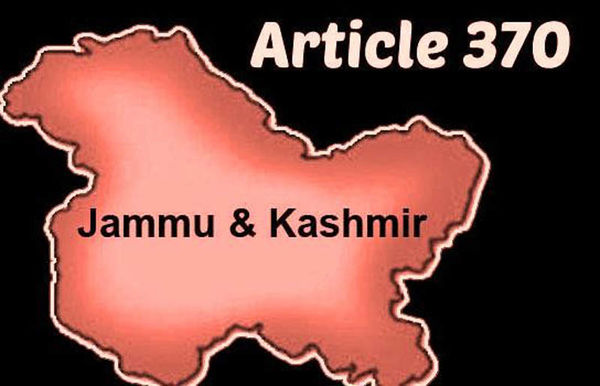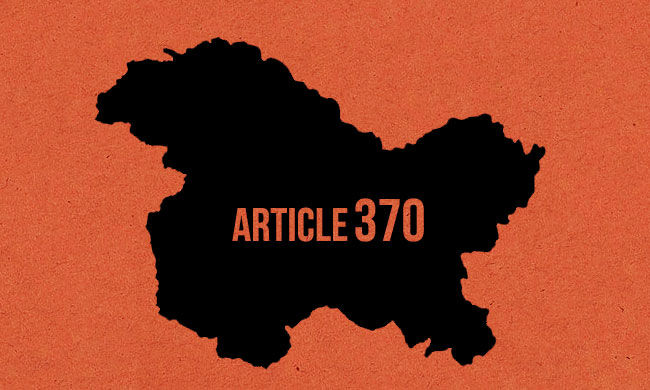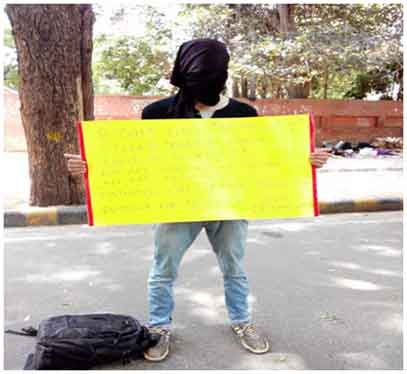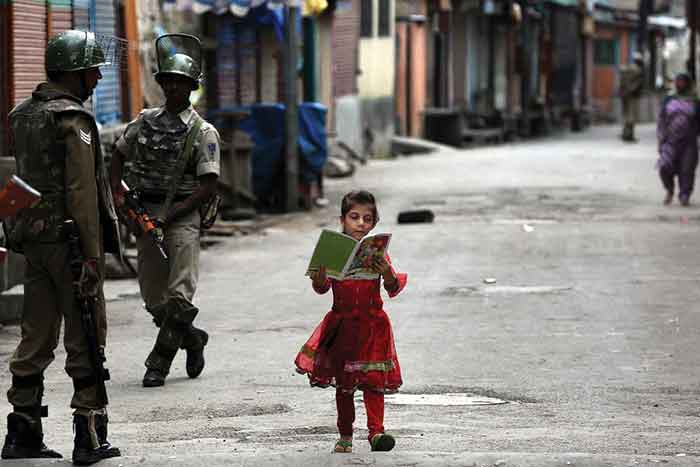
NAPM Stands with the Resistance of the People of Jammu & Kashmir: Struggle to End Oppression, Militarization & Corporate Loot must continue
5th August, 2020 marks the first anniversary of the abrogation of Article 370 of the Indian Constitution, which took away the political autonomy of the only Muslim majority state in the country, severely jeopardized the future of the people of Jammu and Kashmir, and struck a massive blow to Indian federalism. While the government is busy claiming the ‘positive impact’ of the move in terms of ‘success in the war on terror’, ‘development of the state and integration with India’, the reality is quite different.
The step last year was marked by an unprecedented communication blockade, huge increase in militarization and surveillance, curbs on the media, and arrest of political leaders & human rights activists. The combined effect of these was a severe downturn in economic activity, leading to untold hardships for the people of the valley. Once the pandemic started, the additional lockdown meant inadequate access to medical facilities and covid-related information, which in turn complicated the already existing mental health issues caused by the enforced isolation. Far from facilitating ‘integration’, the move has alienated Kashmiris from India more than ever.
Article 370 is a constitutional recognition of the conditions mentioned in the Instrument of Accession that the ruler of Kashmir signed with the Government of India in 1948. The Schedule appended to the Instrument of Accession gave the Indian Parliament power to legislate for Jammu and Kashmir on only defence, external affairs and communications. Kashmir is not the only state for which there have been special provisions put in place either during the early years of the republic or later. Under Article 371-A, Nagaland has a special status, and no Act of Parliament is automatically extended to Nagaland unless its legislative assembly so decides in matters of the religious or social practices of the Nagas, Naga customary law and practices, ownership and transfer of land and its resources. BJP’s tampering with special provisions specific to regions is integral to the Hindutva project of one nation, one religion, one culture.
Concerning Jammu and Kashmir, Article 370 had been tampered with right from its inception, in both letter and spirit. By the Presidential Order of 1954, almost the entire Indian Constitution (including most constitutional amendments) was extended to Jammu and Kashmir. Ninety-four out of 97 entries of the Union List applied to Jammu and Kashmir even before the abrogation last year. Politically, there is a long history of betrayal of the Kashmiri people by successive Indian governments. The plebiscite promised at the time of accession was never held, and the Kashmiri leader Sheikh Abdullah was imprisoned for 11 years.
Democratically elected governments in Kashmir have been dismissed and elections rigged to put in place pro-India governments. Once the repeated betrayals led to the rise of militancy, Kashmir has faced brutal military oppression – rapes, murders, disappearances and constant surveillance. The mass rape at Kunan Poshpora, the hanging of Afzal Guru to satisfy the “collective conscience” of India for the 2001 Parliament attack (despite only circumstantial evidence of his involvement), and the pellet gun attacks in the first term of the Narendra Modi government, are blots on the India-Kashmir relationship. Despite these betrayals, Article 370 helped to retain the fragile historical specificity of the relationship.
While mainstream Indian academia and even sections of civil society have not adequately stood up for the rights of the Kashmiri people, the media and the culture industry have objectified Kashmiris and misrepresented the India-Kashmir equation. The courts have often betrayed the Kashmiris too. The abrogation of Article 370 was blatantly unconstitutional. 370 could not have been deleted without the consent of the Kashmiri people. Yet, Indian courts have failed to strike it down. At present, 23 petitions challenging the abrogation are pending in the Supreme Court. Over the last one year, petitions have challenged the constitutionality of the restrictive orders suspending internet, tele-communications and movement. While Indian courts have accepted that bars on free speech and movement would violate fundamental rights, these bars have not been struck down!
Jammu and Kashmir, alongside Ladakh, now stare at an uncertain future, and so does India. The revocation of Article 35-A alongside Article 370 threatens to open Kashmir up to large scale land acquisition by the Indian Army and by big corporates in the name of ‘security’ and ‘development’, thereby undoing the historic land reforms of 1950, which helped retain the socio-economic indicators of J&K higher than many other states in India. The isolation, restriction, surveillance and state repression show no signs of ending.
The suspension of the political rights of the people of Ladakh is also unacceptable. As far as India is concerned, not only is the move a blow to the federal imagination, it also threatens to de-stabilize the geo-politics of the region and the whole of South Asia in turn. Alienation of a whole people in a region which is ridden with border conflicts does not bode well for the future of India’s much-emphasized “national security” concerns.
National Alliance of Peoples’ Movements salutes the resilience and resistance of the people of Jammu and Kashmir and stands in unflinching solidarity with them.
We unequivocally condemn the moves of the current dispensation which has brutally eroded the political autonomy and long-standing aspirations of the people of the region.
We urge the Government of India and the country’s institutions including the higher judiciary to work towards restoring the special status of J&K, de-militarize the region and fulfil the old promises made by the Indian State to the Kashmiri people.
The true litmus test of India’s democracy, (or the lack of it), in many ways, lies in our respecting the democratic rights of the people of Jammu & Kashmir.
We call upon the citizens of this country to reflect on the history of brutality and betrayal in the region and stand with the people of the valley towards a peaceful and just future for them.
Medha Patkar, Narmada Bachao Andolan (NBA) and National Alliance of People’s Movements (NAPM); Dr. Sunilam, Adv. Aradhna Bhargava, Kisan Sangharsh Samiti; Rajkumar Sinha, Chutka Parmaanu Virodhi Sangharsh Samiti, NAPM, Madhya Pradesh;
Aruna Roy, Nikhil Dey, Shankar Singh, Mazdoor Kisan Shakti Sangathan (MKSS), National Campaign for People’s Right to Information; Kavita Srivastava, People’s Union for Civil Liberties (PUCL); Kailash Meena NAPM Rajasthan;
Prafulla Samantara, Lok Shakti Abhiyan; Lingraj Azad, Samajwadi Jan Parishad & Niyamgiri Suraksha Samiti, Manorama, Posco Pratirodh Sangram Samiti; Lingaraj Pradhan, Satya banchor, Anant, Kalyan Anand, Arun Jena, Trilochan Punji, Lakshimipriya Mohanty and Balakrishna Sand, Manas Patnaik, NAPM Odisha;
Sandeep Pandey (Socialist Party of India); Richa Singh & Rambeti (Sangatin Kisaan Mazdoor Sangathan, Sitapur); Rajeev Yadav & Masihuddin bhai (Rihai Manch, Lucknow & Azamgadh); Arundhati Dhuru & Zainab Khatun (Mahila Yuva Adhikar Manch, Lucknow), Suresh Rathaur (MNREGA Mazdoor Union, Varanasi); Arvind Murti & Altamas Ansari (Inquilabi Kamgaar Union, Mau), Jagriti Rahi (Vision Sansthan, Varanasi); Satish Singh (Sarvodayi Vikas Samiti, Varanasi); Nakul Singh Sawney (Chal Chitra Abhiyan, Muzaffarnagar); NAPM Uttar Pradesh
P. Chennaiah,Andhra Pradesh Vyavasaya Vruthidarula Union-APVVU, Ramakrishnam Raju,United Forum for RTI and NAPM, Chakri (Samalochana), Balu Gadi, Bapji Juvvala, NAPM Andhra Pradesh;
Jeevan Kumar & Syed Bilal (Human Rights Forum), P. Shankar (Dalit Bahujan Front), Vissa Kiran Kumar & Kondal (Rythu Swarajya Vedika), Ravi Kanneganti (Rythu JAC), Ashalatha (MAKAAM), Krishna (Telangana Vidyavantula Vedika-TVV), M. Venkatayya (Telangana Vyavasaya Vruttidarula Union-TVVU), Meera Sanghamitra, Rajesh Serupally, NAPM Telangana;
Sister Celia, Domestic Workers Union; Maj Gen (Retd) S.G.Vombatkere, NAPM, Nawaz, Dwiji, Nalini, NAPM Karnataka
Gabriele Dietrich, Penn Urimay Iyakkam, Madurai; Geetha Ramakrishnan, Unorganised Sector Workers Federation; Suthanthiran, Suthanthiran, Lenin & Arul Doss, NAPM Tamilnadu;
Vilayodi Venugopal, CR Neelakandan, Prof. Kusumam Joseph, Sharath Cheloor, Vijayaraghavan Cheliya, Majeendran, Magline, NAPM, Kerala;
Dayamani Barla, Aadivasi-Moolnivasi Astivtva Raksha Samiti; Basant Hetamsaria, Aloka Kujur, Dr. Leo A. Singh, Afzal Anish, Sushma Biruli, Durga Nayak, Jipal Murmu, Priti Ranjan Dash, Ashok Verma, NAPM Jharkhand;
Anand Mazgaonkar, Swati Desai, Krishnakant, Parth, Paryavaran Suraksha Samiti; Nita Mahadev, Mudita, Lok Samiti; Dev Desai, Mujahid Nafees, Ramesh Tadvi, Aziz Minat and Bharat Jambucha, NAPM Gujarat;
Vimal Bhai, Matu Jan sangathan; Jabar Singh, Uma, NAPM, Uttarakhand;
Manshi Asher and Himshi Singh, Himdhara, NAPM Himachal Pradesh
Eric Pinto, Abhijeet, Tania Devaiah and Francesca, NAPM Goa
Gautam Bandopadhyay, Nadi Ghati Morcha; Kaladas Dahariya, RELAA, Alok Shukla NAPM Chhattisgarh;
Samar Bagchi, Amitava Mitra, Binayak Sen, Sujato Bhadro, Pradip Chatterjee, Pasarul Alam, Amitava Mitra, Tapas Das, Tahomina Mandal, Pabitra Mandal, Kazi Md. Sherif, Biswajit Basak, Ayesha Khatun, Rupak Mukherjee, Milan Das, Asit Roy, Mita Bhatta, Yasin, Matiur Rahman, Baiwajit Basa, NAPM West Bengal;
Suniti SR, Sanjay M G, Suhas Kolhekar, Prasad Bagwe, Mukta Srivastava, Yuvraj Gatkal, Geetanjali Chavan, Bilal Khan, Jameela, Ghar Bachao Ghar Banao Andolan; Chetan Salve, Narmada Bachao Andolan, Pervin Jehangir, NAPM Maharashtra;
Faisal Khan, Khudai Khidmatgar, J S Walia, NAPM Haryana;
Guruwant Singh, Narbinder Singh, NAPM Punjab;
Kamayani Swami, Ashish Ranjan, Jan Jagran Shakti Sangathan; Mahendra Yadav, Kosi Navnirman Manch; Sister Dorothy, Aashray Abhiyan, NAPM Bihar;
Rajendra Ravi, NAPM; Bhupender Singh Rawat, Jan Sangharsh Vahini; Anjali Bharadwaj and Amrita Johri, Satark Nagrik Sangathan; Sanjeev Kumar, Dalit Adivasi Shakti Adhikar Manch; Anita Kapoor, Delhi Shahri Mahila Kaamgaar Union; Sunita Rani, National Domestic Workers Union; Nanhu Prasad, National Cyclist Union; Madhuresh Kumar, Priya Pillai, Aryaman Jain, Divyansh Khurana, Evita Das; Anil TV, Delhi Solidarity Group, MJ Vijayan (PIPFPD)
For any further details, contact: [email protected]
SIGN UP FOR COUNTERCURRENTS DAILY NEWSLETTER

